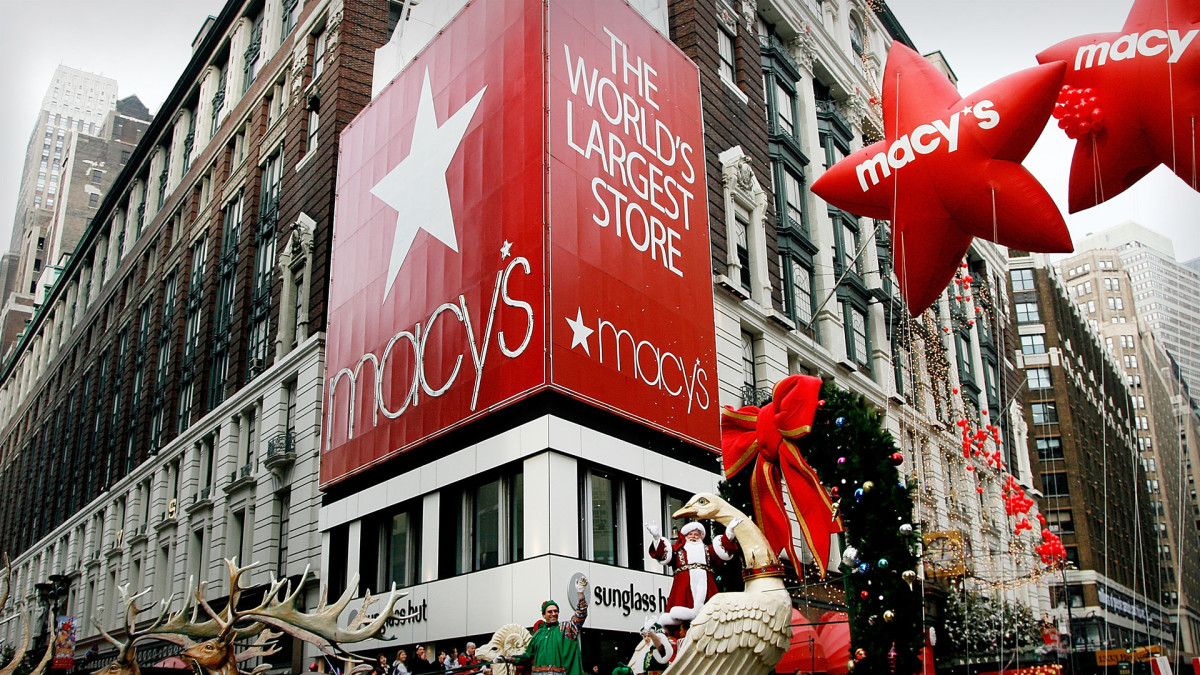
The 21st century has been really tough on department stores.
The biggest chains expanded rapidly at first, putting new stores seemingly everywhere, only to see their plans and business models crushed.
The problem was partly economic, historically due to the dot.com bust, the Sept. 11 terror attacks, and the Covid-19 pandemic.
Plus, what shoppers wanted changed. Suits and business attire sales slumped because of the rise of business casual.
Twenty years ago, one would never see a big banker in anything less than a suit and tie. Now, we see JPMorgan Chase (JPM) CEO Jamie Dimon in an open white shirt and a blue blazer all the time.
Perhaps more important was the internet, which profoundly changed how we shop.

Joe Kohen/WireImage/Getty
A historic brand struggles to survive
Macy's (M) , perhaps best known for the Macy's Thanksgiving Day Parade, is one of the oldest (founded 1858) and most powerful brands in retailing. (One of its early owners went down with the Titanic.)
It also owns Bloomingdale's, one of the storied American luxury brands, and (speaking of the 21st century) Bluemercury, the cosmetics chain founded in 1999 and acquired by Macy's in 2015.
Related: Essential retailer in bankruptcy closes more stores
The company has been staggered repeatedly by changing retailing trends, plus a history since the 1980s of takeover fights, mergers, and a stubborn insistence on changing local store names like Filene's in Boston or Marshall Field's in Chicago to Macy's.
In 2017, Macy's operated nearly 800 stores nationwide and three overseas. Since then, it has shuttered nearly 17% of those stores because sales started sliding.
The stock price has slumped, touching $10.54 in mid-October before an end-of-year rally kicked in.
It has announced several recovery plans that haven't succeeded.
Yet, after years of stress at the chain, one analyst thinks things are starting to look up.
Macy's next turnaround includes store closures
Last year was challenging. Fourth-quarter sales of $8.12 billion were off 1.7% from a year earlier. Macy's lost $71 million, including a $1 billion charge for restructuring and write-down of assets. On an adjusted basis, it earned $2.45 a share, up from $1.88 the year earlier and better than Wall Street expected.
Sales for the last fiscal year were $23.1 billion, off 5.5% from a year earlier.
For the current fiscal year, it sees revenue at $22.2 to $22.9 billion, down from 2023, and adjusted earnings at $2.45 to $2.85 a share.
The company also unveiled a plan to right the ship and start growing again. Chief Executive Tony Spring named it "a Bold New Chapter."
It includes:
- Closing 150 more stores over the next two years.
- Focusing on more profitable stores aimed at more affluent customers. It will open new Bloomingdale's and Bluemercury stores.
- Continuing to add smaller, more efficient stores.
- Getting its accounting and inventory management systems under control. The goal, according to analysts from the Telsey Advisory Group, is to let managers focus on new demand creation and "less on managing markdowns and promotions."
Companies like Walmart (WMT) and Costco Wholesale (COST) , by contrast, are still finding ways to expand and grow sales. Shares of Dillard's Inc., (DDS) , a Macy's competitor, have performed more strongly than Macy's.
A retail analyst explains her thinking
Telsey Group, based in New York and headed by its founder and lead analyst, Dana Telsey, thinks the plan has a chance.
The firm raised its price target on the stock to $21 from $15, which would mean a 20% gain over the Thursday close.
Her reasons stem in part from a decent holiday shopping season. Fourth-quarter adjusted earnings per share were $2.45, the best showing in several years.
"We believe paring down the Macy's store base to a more manageable (and profitable) size is prudent given the general structural shift towards online spending and the traffic shift away from department stores," said Telsey in a note to clients.
More Retail:
- Costco unveils executive change that could trigger membership-fee boost
- Walmart makes a surprise move that investors will love
- Analyst unveils new Lowe's stock price target ahead of earnings
Plus, there's been progress in getting the little things right, such as keeping the inventory turnover rate, a key efficiency measure that helps profit, at three times. It hit 2.5 or lower during the pandemic.
And the stock is up 65% since its October low, a stronger performance than the SPDR S&P Retail ETF (XRT) . It's up just 32%.
Still, Telsey rates the stock a market perform, effectively neutral.
"Given the Q4 performance, the initial outlook for FY24, and current trends in the business, we are reducing our estimates for the year. We now look for FY24 EPS of $2.70 (from $3.10 previously), as compared to $3.50 in the prior year period and the market's prior expectation for EPS of $2.76," wrote Telsey.
Adam Maeder at TD Cowen cut his price target to $20 from $23 and dropped his rating from outperform to market perform.
Related: Veteran fund manager picks favorite stocks for 2024







